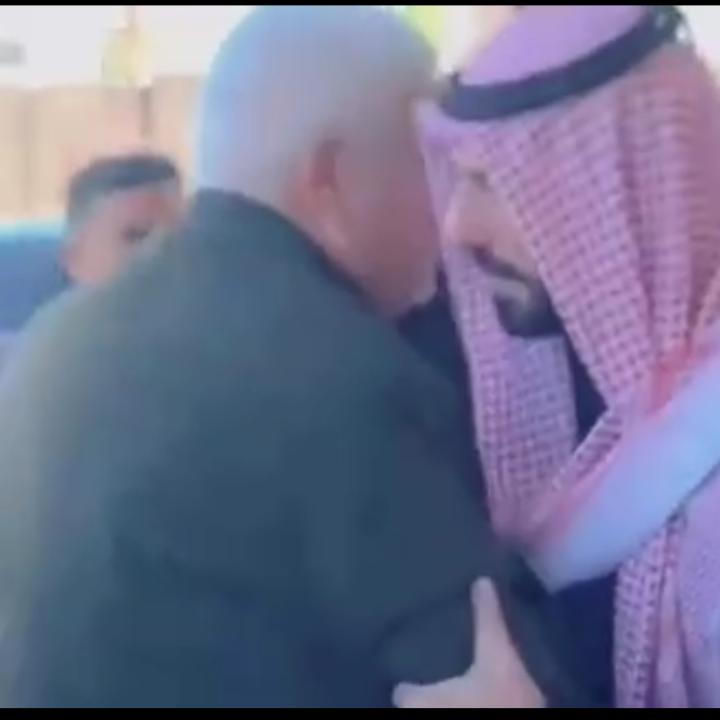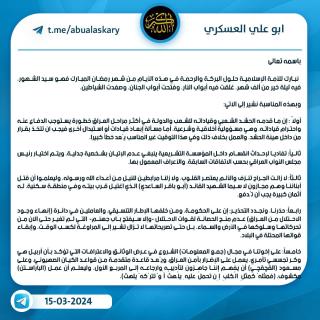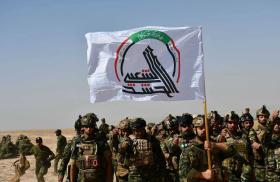
Qais al-Khazali Calls for Faleh al-Fayyad's Removal as PMF Chairman

Asaib Ahl al-Haq is moving to get what it has long sought: a senior leadership role within the Popular Mobilization Forces, a glaring gap in its portfolio of power positions.
On March 15, Abu Ali al-Askari, head of security for the Iraqi militia Kataib Hezbollah (KH), issued a statement in which he made clear that "any decision to remove any [Popular Mobilization Forces (PMF)] leaders or replace them with others must be made within the PMF Commission...To do otherwise at this time is inappropriate and a big mistake" (Figure 1).
This was likely a reaction to a statement by Qais al-Khazali, the leader of Asaib Ahl al-Haq (AAH), who publicly called for the replacement of PMF chairman Faleh al-Fayyad. Khazali appeared on al-Rafidain Forum on March 5 and suggested that it was time for Fayyad to resign. His argument focused on two points: first, that Fayyad has exceeded the legal age for his position, and second, that Fayyad should not serve as both the head of the PMF and the leader of a political party. According to Khazali, the Coordination Framework (CF), Iraq's Shia leadership coalition, believes that Fayyad should hold a political position, not a security role, arguing that he can take any political position (e.g., vice president) "after his resignation from his post as head of the PMF" (Figure 2).
Before Khazali's remarks, AAH figures launched a stinging rebuke against Fayyad, questioning his integrity. On March 1, Fayyad was photographed shaking hands with Ali Hatem al-Suleiman, a Sunni tribal leader from Anbar who was part of the Sunni protest movement during Nouri al-Maliki's premiership. The self-styled muqawama (resistance) has accused Suleiman and other protest leaders of facilitating the Islamic State takeover of Iraqi Sunni regions in 2014. In April 2022, Suleiman returned to Baghdad from exile after terrorism charges against him were dropped—a move that was apparently orchestrated by the CF to curb the rising influence of then-speaker of parliament Mohammed al-Halbousi.
AAH used the handshake photo to attack Fayyad. Hassan Salim, a member of AAH's parliamentary bloc, al-Sadiqoun, tweeted on March 2, “How will Fayyad answer the families of the martyrs after he visited Ali Hatem al-Suleiman, who stood on the sedition podium to support terrorism and incite people to topple the political process and attack security forces, especially the PMF...Does he deserve to be the leader of our holy PMF?” (Figure 3).
Another AAH parliamentarian, Ahmed al-Musawi, criticized Fayyad on March 4: “We thought you were going to apologize to the families of the martyrs for the sin you committed by shaking hands with one of the leaders of the sedition." Musawi then threatened Fayyad, stating, "We will fulfill our religious and legal obligation toward you” (Figure 4).
In response to this AAH attack campaign, Fayyad appeared on UTV on March 3 and characterized his meeting with Suleiman as a coincidence, emphasizing that he went to meet with another tribal leader and only greeted Suleiman to respect tribal traditions upon realizing that he was present at the gathering. Yet this controversy is not really about greeting Suleiman, who would never have been permitted to return to Anbar in the first place without a green light from AAH and other major Shia militias. This is about rivalry between two major muqawama militias.
On one side is AAH, which believes it has not been granted the roles it deserves within the PMF and now wants to steer and control Fayyad's eventual replacement. On the other side is KH, which exerts the most influence in the PMF—not least because KH commander Abu Fadak holds the position of PMF chief of staff, the commission's real leader. The group is unwilling to share this influence with a powerful new AAH leader inserted at Fayyad's level. Overall, this is just another sign of Khazali taking more aggressive steps against the CF's "old guard," whether they are members of the Badr Organization or independents like Fayyad.




